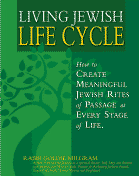When we hear someone has died, we need a way to express ourselves. Jewish tradition provides a very powerful and brief sacred phrase: baruch dayan ha'emet (pronounced bah-rukh, dah-yahn, hah'eh-meht). This phrase seems to be the bare minimum of a blessing, truncated from our usual blessing form, as many as twelve terms short*; cut down, as has been a life.
What does this phrase mean?
Ha-Emet – The Truth. While we were doing chevruta (sacred study, one-on-one) on baruch dayan emet, my colleague Rabbi Shawn Zevit noted that for him: "The emet—Truth-- is the focus. I am acknowledging that, this is the Truth. In this way, we help ourselves move into acceptance, rather than denial."
Emet is one of the 105 metaphorical names for God in Judaism. Emet fits best as a form of address while we are frozen in the immediate learning of a loss of life, because other names might feel false on our tongue, e.g., anthropomorphic names of adulation: Adonai Eloheynu (Lord, our God), of fealty – melech (king); or the wonderful holy feeling embedded in most blessings of engaging in good deeds – mitzvot.
There are many mitzvot involved in supporting a family, friend, or community, who are dealing with a death; these all come later. The moment of hearing of a death, is a uniquely personal. Even a death that comes as a kindness for one who has been suffering terribly, that death, in truth, also may herald a radical change in our lives.
Dayan – Judge.
Upon hearing of a death, we feel acted upon, disempowered, bereft. We didn't misplace our loved one, as when someone says: "I lost my husband." No, lives are ended – by war, accident, disease, error, suicide, old age. There is no effective bakkashah, "plea," to bring someone back, nor will expressing fealty to "My Lord," or "Our God," change a thing. Our sages ask us to accept derekh ha-teva, the way of nature, to realize that no cosmic judge was punishing our friend, associate or loved one for some known, or unknown, evil. We know things that are horrible from our vantage point, happen to good people.
Often loss hurts, sometimes almost beyond endurance, to the point that we can't help but plead to know why must we be sentenced to endure this transformation in our loves and lives. This is why Dayan, "Judge," is another fitting name, as an anthropomorphic metaphor for how we feel – that a difficult verdict has entered our own lives -- loss, death, the departure and ascent of a soul beyond our world of experience.
Baruch – Bless.
There is a mitzvah called yirah, living in awareness of the awesome/fearsomeness of creation. We are being embedded in a larger field of being than we can ever hope to control or fully understand. My teacher, Rabbi Zalman Schachter-Shalomi terms this the Godfield. We appear to co-create the Godfield with our blessings; shaping the experience of learning of a death ever so slightly by saying baruch dayan ha'emet. It is not given to us to know if our sages were right, and a young soul was recalled because it had other lives and only a tiny bit of work to finish up in this life. We can't know if a soul has a particular talent that is needed in another dimension, and it has been recalled for higher service. We can't penetrate the mystery called death. We only know the awesomeness of life and the blessing that this person was in our life. This we can bless – the time we had, our awe at the gift of life, and the fearsome/awesome threshold called death of the body, beyond which we, the living cannot go.
Baruch dayan ha'emet. Blessed be the True Judge (other translations are possible). These words reappear at the funeral, as first degree relatives receive a kriyah (tearing) ribbon and rend it to signal they are mourners and, to symbolize their hearts torn open in grief.
So few words and they help us to address and express so much.
Note: This blessing also applies to other situations where difficult news is received, see Mishna Berachot 9:2. The sages seem to build this understanding upon the words of Job to his wife: "Shall we accept the good from God, and not the bad?"(Job 2:10).

For a step-by-step guide to Jewish dying, funeral and mourning practices that includes spirituality and meaning of each practice, please see:
Living Jewish Life Cycle: How to Create Meaningful Jewish Rites of Passage at Every Stage of Life (Jewish Lights Publishing)
Words of traditional blessing that do not appear in the barukh dayan ha-emet blessing are:
*atah adoshem elokeynu melech ha-olam, asher kidshanu b'mitzvotav, v'tzivanu l'
This teaching by Rabbi Goldie Milgram first appeared at Jewish Values Online, a content-rich website that we commend to you. It includes responses to ethics questions from across the full-spectrum of Jewish practice.
 For a step-by-step guide to Jewish dying, funeral and mourning practices that includes spirituality and meaning of each practice, please see: Living Jewish Life Cycle: How to Create Meaningful Jewish Rites of Passage at Every Stage of Life (Jewish Lights Publishing)
For a step-by-step guide to Jewish dying, funeral and mourning practices that includes spirituality and meaning of each practice, please see: Living Jewish Life Cycle: How to Create Meaningful Jewish Rites of Passage at Every Stage of Life (Jewish Lights Publishing)